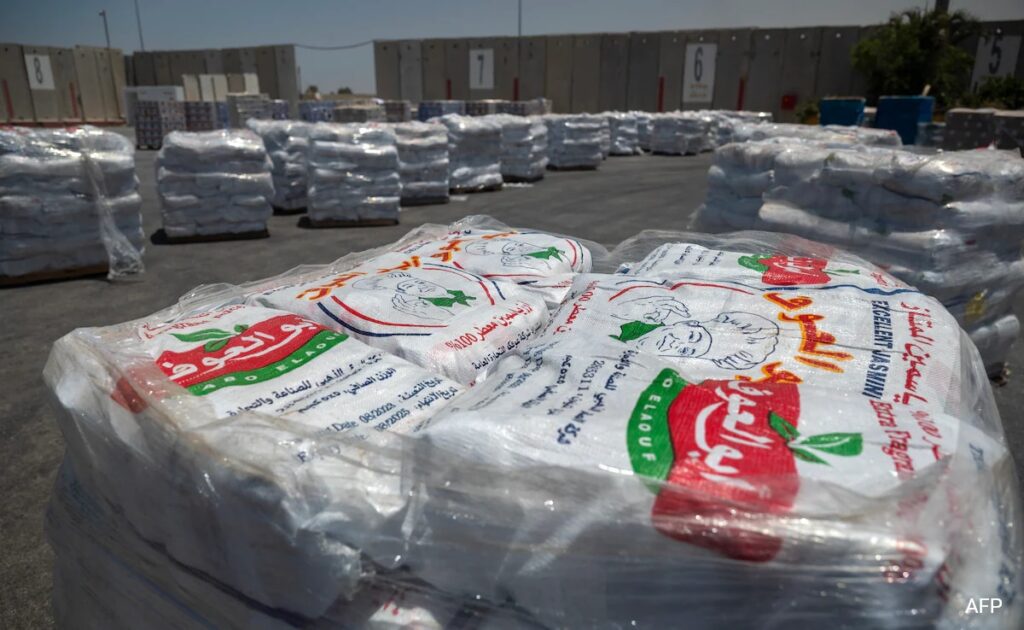Jerusalem:
Days after Israel announced a daily pause in fighting on key routes to allow more aid to reach Gaza, chaos continues in the besieged Palestinian territory, with vital supplies piling up and remaining undistributed in the scorching summer heat.
More than eight months of war, which began with an unprecedented Hamas attack on Israel on October 7, has left the humanitarian situation in the Gaza Strip dire, with the United Nations repeatedly issuing warnings of famine.
As the fighting rages, desperation is growing among Gaza's 2.4 million residents, with agencies warning they will not be able to deliver aid.
Israel said it had allowed supplies to be imported and urged agencies to step up deliveries.
“The breakdown in security and security has increasingly put humanitarian operations and activities in Gaza at risk,” the U.N. Office for the Coordination of Humanitarian Affairs (OCHA) said in a briefing late on Friday.
“Fighting, as well as criminal activity and the risk of theft and banditry, have effectively prevented humanitarian access to key areas.”
But Israel claims it has allowed hundreds of trucks of aid to flow into southern Gaza, while trading accusations with the UN over why the aid is piling up.
The paper published aerial photographs showing containers lined up on the Gaza side of the Kerem Shalom crossing, with trucks arriving to add to the stockpiles.
Hamas attacks on Israel in October killed 1,194 people, most of them civilians, according to an AFP tally based on official Israeli figures.
Militants also took 251 hostages, of which 116 remain in Gaza, while the army says 41 have been killed.
The health ministry in the Hamas-controlled Gaza Strip said Israel's retaliatory strikes had killed at least 37,551 people, the majority of them civilians.
passing the buck
As security collapses in the Gaza Strip, the UN said it has been unable to receive any supplies from Kerem Shalom since Tuesday, leaving vital aid in limbo.
A deputy UN spokesman said this week that the checkpoints were “limited in function, including due to fighting in the area”.
William Schomberg, head of the International Committee of the Red Cross in Rafah, said arranging trucks from the Egyptian side was particularly complicated.
“This is not just a security issue, but often you have to cross a war zone,” he said in an online briefing, adding that the area near Kerem Shalom was hostile.
“Rockets were also fired nearby. This makes the whole area particularly difficult to navigate for reasons related to hostilities and for reasons related to general security.”
Israel's Coordinator of Civil Affairs in the Palestinian Territories (COGAT) said on Thursday that “1,200 aid truck loads are awaiting collection by UN relief agencies,” blaming the shortage on supplies.
COGAT spokesman Shimon Friedman told reporters at the checkpoint earlier this week that the daily closure of the southern road into the Gaza Strip was to allow the UN to “collect and distribute more aid” in tandem with the Israeli military presence.
He said much of the aid is not moving because “organizations have not taken sufficient steps to improve their distribution capacity.”
“There's no help in sight”
Aid agencies instead say the worsening humanitarian crisis is hampering relief efforts, pointing to Israel's offensive on the southern city of Rafah, displacing more than a million people, and sealing off the border with Egypt.
Schomburg described the city of Rafah as a “ghost town.”
“It's a ghost town, barely anyone there, the level of destruction is high and it's just a symbol of the tragedy that's been unfolding in Gaza over the last nine months,” he said.
The UN food agency said a convoy carrying aid was looted by “desperate people” in the Gaza Strip.
As the two sides stalemate, it is Gaza's civilians who are paying the price.
“We don't receive any aid, we buy everything we eat with our own money and it's very expensive,” said Um Mohammad Zamrat, 66, who is from north Gaza but now lives in Khan Younis in the south.
“Even agencies that specialize in delivering aid can't provide us with anything,” she added.
Non-governmental organization Doctors Without Borders said on Friday that six trucks carrying 37 tonnes of supplies, mostly medical supplies, have been stuck on the Egyptian side of Kerem Shalom since June 14.
“This is incomprehensible and unacceptable,” the statement said.
“That's like asking firefighters to watch a house full of people burn while interfering with their efforts to put out the fire.”
(Except for the headline, this story has not been edited by NDTV staff and is published from a syndicated feed.)



